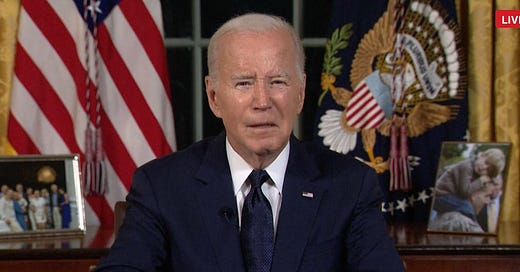Biden's Brilliant Empathy and Three Other Glimmers of Hope
Once again, I try to find a few ponies in the manure.
Events in the Mideast are at a perilous juncture, with a wider regional war quite possible and a humanitarian crisis worsening in Gaza. The global media was manipulated by terrorists into promoting anti-Israel propaganda about the explosion at a Gaza hospital. For all of President Biden’s hopes for peace, the battered dream of a two-state solution has been deferred yet again. In this country, every dope on both sides is mouthing off, though the virtue-signaling ignorance of protesters who chose this moment to back the Jew-hating agenda of terrorists is especially galling. Make no mistake: “From the river to the sea” means no more Israel.
But as someone who self-identifies as “an idealist without illusions,” as John F. Kennedy described himself, I might as well play to type and find a few more ponies in the manure (to use Ronald Reagan’s description of his optimism), or in this case, in the carnage of the Israel-Hamas War.
This week’s hopeful news comes on four fronts: Biden’s leadership against the “unadulterated evil” of Hamas and Vladimir Putin; the outlook for the humanitarian crisis; the order of battle in the coming Israeli ground invasion; and the future of Israeli democracy.
Biden is meeting the moment
His primetime address was — like everything he has said since 10/7 — pitch perfect in tone and substance. He connected events in Israel and Ukraine to the cause of freedom and made us believe — as FDR did in the run-up to World War II — that the United States must be “the arsenal of democracy” to confront this “inflection point in history.”
The speech marked the launch of an historic military aid package for Israel, Ukraine and Taiwan—$100 billion dollars that will allow all three democracies to defend themselves for years without American boots on the ground. By taking advantage of Israel’s peril to win public and congressional support, Biden is executing a three cushion shot: defending democracy abroad, creating defense jobs at home, charting a new, influential global role for the U.S. in the 2020s and beyond.
This president is on his way to being a major historical figure, for reasons that grow out of his experience and personal suffering. It’s not just that Biden’s support for Israel and Ukraine is heartfelt and convincing; the president’s brilliant empathy (“I see you. You belong”) reinforces democratic values and creates the space for tough love with our allies. That doesn’t guarantee that Netanyahu (or Zelensky or Arab allies) will always listen and defer — these relationships are complicated — but Biden’s approach offers the U.S. a much stronger voice than it would have under any other president.
I was especially struck when Biden said during his courageous trip to Israel: “Justice must be done. But I caution that, while you feel that rage, don't be consumed by it. After 9/11, we were enraged in the United States. While we sought justice and got justice, we also made mistakes.”
This point — reiterated in his Oval Office address — is something new in the history of the presidency. Until Donald Trump, presidents occasionally accepted responsibility for failures, as JFK did in 1961 after the Bay of Pigs fiasco and Barack Obama did after the botched rollout of healthcare.gov. But they tend to favor the passive voice (“Mistakes were made,” Ronald Reagan said in 1987 in reference to the secret scheme to trade arms for hostages) or vague references to history (“There have been times where America has shown arrogance and been dismissive, even derisive,” Obama said in 2009).
In this case, Biden was talking about a specific colossal mistake: Responding to 9/11 by going to war in Iraq, a horrible decision by President Bush that Biden says he regretted backing in the Senate. It’s unlikely Biden will stop Israel from invading Gaza, and he’s probably not even trying to do so. But by conditioning his trip to Israel on an informal agreement to delay the ground assault for a few days, he gave more Palestinians a chance to get out of Gaza City, likely saving thousands of lives. And by stressing the plight of the hostages (whom Bibi prefers to ignore), emphasizing the rules of war and opposing any prolonged Israeli occupation, Biden likely took the brutal edge off Israel’s plans for Gaza, a decision in the interest of both Palestinians and Israelis.
Help for Gazan civilians is on the way
As part of his trip, Biden struck a deal with Egypt and Israel to allow supply trucks to enter the strip with critically-needed humanitarian assistance. Israel’s decision to cut off electricity and water was both inhumane and dumb. It squandered much of the sympathy for 10/7 and didn’t hurt Hamas, which has plenty of generators, food and water for its fighters (not civilians) as it prepares for battle. But now conditions for refugees will likely improve, especially if Egypt bows to international pressure and provides a few hundred acres for refugee camps in the Sinai. The opening of the border also increases the odds that American and other non-Israeli hostages will be released and transported to safety through Egypt. It turns out Hamas didn’t intend to take all those hostages in the first place.
Is it good that hundreds of thousands of people have been forced from their homes (as has happened in almost every major war in human history)? Of course not. But it is necessary in order to keep them alive.
Biden was right, by the way, to call the leadership of Hamas a bunch of “cowards.” While urging civilians to stay in Gaza City, where many will die as human shields, Ismail Haniyeh, senior political leader of Hamas, is in Qatar. Rumors that he was roughing it at the Four Seasons were so persistent that the hotel was forced to tweet that he was not in residence.
In 1999, I visited Kosovar refugees in Macedonia and Albania. More than 500,000 had left Kosovo in a two-week period and another 350,000 came in the next two months. My visit was sobering and often sad, but I was impressed by how the UN and relief organizations stepped up to the challenge. They can do so again.
Favorable order of battle
Every military analyst, inside Israel and out, says this war will be long and hard, with grueling urban combat. I am not in a position to doubt that. The network of tunnels Hamas has built will allow its fighters to melt away and defend themselves against Israeli tanks and superior firepower. The casualties on both sides will be heavy. But I have been struck by how little commentary we’ve heard about the order of battle. Hamas has about 40,000 fighters; Israel mobilized 360,000, and even if 200,000 are dispatched for combat on the Lebanese border, Israel would still have a 4:1 manpower advantage in Gaza.
That won’t mean the war ends in six days (as in 1967) or 19 days (as in 1973); those were armies fighting armies, not guerrilla war. But it could be shorter than expected. The Battle of Hue in 1968 lasted one month and the Battle of Fallujah in 2004 lasted six weeks. In both cases, American forces took the city in bloody house-to-house combat with a small fraction of the troops Israel will deploy.
Good news for Israeli democracy
Finally, we haven’t heard much since 10/7 about Netanyahu’s plan to subvert Israel’s democracy by overhauling its judiciary. The nation has pulled together in grief and grit. But the people mobilizing to rescue the country in its time of need are for the most part not the members of far-right religious parties who dodge military service. It’s the more secular Israelis who took to the streets repeatedly to protest Bibi’s power grab. Essential members of his emergency coalition — including former defense minister Benny Ganz — have been among his fiercest opponents.
Now Bibi is plummeting in the polls and Ganz is surging. That could change, depending on the outcome of the war and many others factors. But the odds of Netanyahu succeeding in his judicial overall are now small.
That is a not-so-small silver lining inside these calamitous events.
On October 26th, I’ll host a conversation with Woodward and Bernstein that will range from Nixon and Watergate to Trump and the future of democracy, with time for discussion of their new books and analysis of what lies ahead in this perilous time. Join me for a landmark event with the reporters who changed history and journalism forever.
WHEN: Thursday, October 26th @7:30PM
WHERE: NJPAC, Prudential Hall, 1 Center Street, Newark, NJ
PRICE: $39-$79 (Use promo code 20ALTER for 20% discount)







This was the strongest speech I have heard Biden delver during his presidency. Your fine essay does him justice.
President Biden has shown his wisdom and talent as a statesman by plugging the dike that restrains fanaticism like the fabled Dutch boy. Added to his strong record of accomplishments, he deserves to be re-elected. However, like you, I am unsettled by the prospects for another upsetting in the 2024 presidential battle. The recent events in and around Gaza emphasize the polarization and fluidity in American politics. It is not a stretch to compare the wider international landscape in 2023 to 1914, 1939, or 1962. Thanks for showing us the ponies.